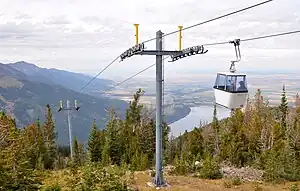| Wallowa Lake Tramway | |
|---|---|
 Tramway from top of Mount Howard with Wallowa Lake in the background | |
| Overview | |
| Status | Operational |
| Character | Recreational |
| Location | 59919 Wallowa Lake Highway Joseph, Oregon |
| Country | United States |
| Coordinates | 45°15′49″N 117°10′51″W / 45.26355°N 117.1809°W |
| Termini | Mount Howard |
| Elevation | lowest: 4,450 feet (1,360 m) highest: 8,150 feet (2,480 m) |
| No. of stations | 2 |
| Construction begin | 1968 |
| Open | 1970 |
| Website | wallowalaketramway |
| Operation | |
| Carrier capacity | 4 |
| Operating times | mid-May until early October |
| Trip duration | 15 minutes |
| Technical features | |
| Aerial lift type | Mono-cable gondola detachable |
| Line length | 19,300 feet (5,900 m) |
| No. of support towers | 25 |
| Installed power | 150 h.p. |
The Wallowa Lake Tramway is an aerial cable gondola lift near Joseph, Oregon, in the Wallowa-Whitman National Forest of the United States, named for Wallowa Lake. The tram runs from the floor of the Wallowa Valley to the top of Mount Howard.[1] It travels to an elevation of 8,000 feet (2,400 m) above sea level and allows for views of the Eagle Cap Wilderness area and the rest of the Wallowa Mountains.[2]
History
The tramway was built in 1968,[3] and opened for service in 1970.[4] In June 1992, a malfunction caused the evacuation of the lift's passengers who were then flown by helicopter down the mountain, with no injuries reported.[5] This was the first safety incident for the tram.[4] Later that year, the tramway was used to haul fire fighters fighting a forest fire to the top of the mountain.[6] In 1999, tram owners explored expanding the tramway to include a winter resort.[7]
Operations
Twenty-five towers are used along the route to support the cables of tramway.[3] The Wallowa Lake Tramway rises 3,700 feet (1,100 m) vertically,[8] starting at the 4,200-foot (1,300 m) level of the lake.[9] At the top of the gondola ride, an elevation of 8,150 feet (2,480 m), is Oregon's highest restaurant, the Alpine Grill.[10] The Tramway runs May through October.[11] It formerly ran on the weekends in winter for skiing and snowshoeing.[12] The four-person gondolas take fifteen minutes to make a one-way trip.[8][12]
The tram is the steepest four-person gondola in North America, ending at the 8,256-foot (2,516 m) peak of Mount Howard.[13] The tram is operated on 115 acres (0.47 km2) of land leased from the Forest Service through a special national forest permit.[7] At the summit one can view wildlife,[1] and wildflowers in an alpine meadow. Parts of Oregon, Washington, and Idaho are visible from the summit. Two miles (3 km) of hiking trails are available.[4]
References
- 1 2 Oppenheimer, Laura. Beyond Bend. The Oregonian, August 19, 2007.
- ↑ Producer offers glimpse of adventures in Oregon. Albany Democrat-Herald, April 10, 2007.
- 1 2 Oregon's Eagle Cap opens to skiers. Spokesman Review, December 31, 1997.
- 1 2 3 Richards, Suzanne. Little Switzerland destination Northwest. The Oregonian, January 6, 1991.
- ↑ Malfunction forces removal of 7 from aerial tramway car. The Oregonian, June 2, 1992.
- ↑ Meehan, Brian T. 100 firefighters battling blaze in remote Mount Hood forest. The Oregonian, August 22, 1992.
- 1 2 Barker, Eric. Owners of Wallowa Lake Tramway want to expand; Owners of tramway ask the U.S. Forest Service for permission to expand into a full-scale ski area. Lewiston Morning Tribune, October 16, 1999.
- 1 2 Lorton, Steven R. Wonderful Wallowas; Wallowa Mountains, Oregon. Sunset, August 1, 2000, No. 2, Vol. 205; Pg. 34 ; ISSN 0039-5404.
- ↑ Miller, Walt. Water and wildlife add zest to best campgrounds. The San Diego Union-Tribune, March 15, 1992.
- ↑ Summit Grill & Alpine Patio. Wallowa Lake Tramway. Retrieved on February 26, 2008.
- ↑ OPERATING CALENDAR. Wallowa Lake Tramway. Retrieved on September 1, 2017.
- 1 2 Richard, Terry. The Wallowas in winter. The Oregonian, December 17, 2000.
- ↑ Wood, Terry. Get Out - Eastern Oregon: Serious hikes, spectacular scenery put the WOW in Wallowa. The Seattle Times. September 13, 2007.
External links
- Wallowa Lake Tramway (official website)